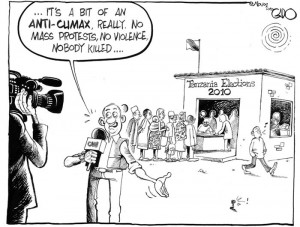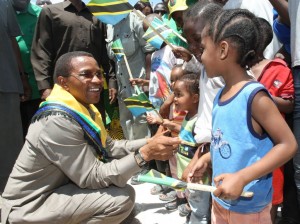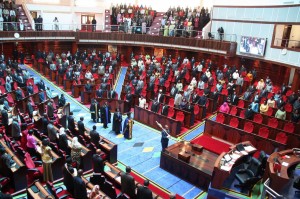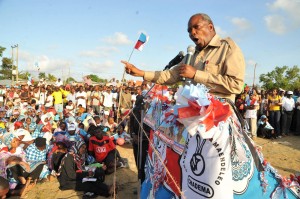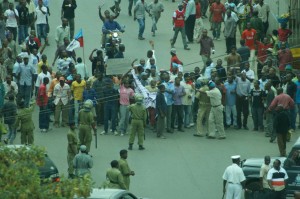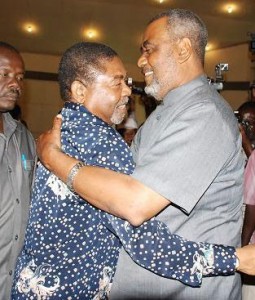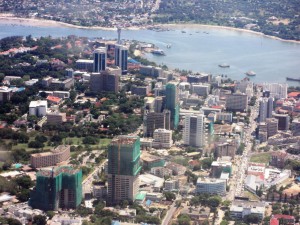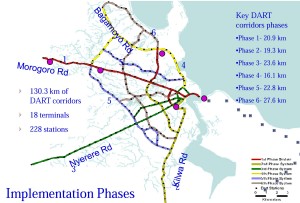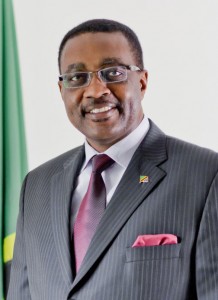Compiled by Donovan Mc Grath
‘A disgrace that we have to import food’ – New African (November 2010, No. 500)
In celebration of its 500th issue, New African magazine reprinted several noteworthy articles of the previous century to be read in retrospect. President Julius Nyerere’s message to Tanzania’s farmers (published in June 1981) was among these articles. Below is an extract on the realities behind the late president’s remarks:
‘… Julius Nyerere, recently told his countrymen they were facing “a serious food shortage” as a result of floods and droughts during the past four years … Nyerere said that last year [1980] Tanzania spent $83.3m on food imports … [M]inister for agriculture, John Malecela, warned Tanzanians that the country would run out of food … [A]bout 96% of the population, live in rural areas … President Nyerere has said that it was time for peasants to discard the primitive methods of farming inherited from their grandfathers, and engage instead in modern farming by using fertilisers and other advanced techniques.’ Immediately following the end of the article, NA remarks on what has happened since by saying: ‘Tanzania, like most African countries, still imports food. The Old Man must be turning in his grave.’
Introducing Kamba, Plaited Rope from Tanzania – Living Woods (November-December 2010)

Innovative kamba weave on a stool (photo Mike Abbott)
It is amazing where Tanzania turns up! This is a wonderful article by Graham Cole published in ‘Living Woods’
Extract: ‘People in Africa could teach us plenty about using natural materials, from rushes and grasses to trees great and small … The natural material which I want to introduce here is a rope made from palm leaves. It’s made by plaiting leaf fronds together and the resulting rope is amazingly consistent in size. The leaves come from the tall doum palm which gracefully lines the banks of rivers in dry parts of Africa or from a dwarf palm which has its leaves conveniently close to the ground for harvesting. The rope which I prefer to call by its Swahili name “kamba”, has many uses including making chair seats and resilient bed bases. Some people also use palms leaves for thatching houses and for weaving mats, hats, baskets, fans and food covers…
‘Subsistence farmers can make kamba during the long dry season when there is little work to do on the land. The dwarf palms in Masasi District are evidently sustainable in their natural habitat and do not have to be planted in place of food crops. I was keen therefore to expand the trade in kamba to this country and I began importing it with the help of an Anglican monk whom I had met in Masasi and he arranged for someone to send me parcels by sea mail…
‘A number of chair makers have been enthusiastic customers and several leading teachers of greenwood crafts have encouraged pupils to use kamba in place of hemp or rush. One advantage is the greater width of kamba which allows for coverage with far fewer turns and so the time taken to weave a seat is reduced. As kamba is very strong an open weave is quite practical …
‘Kamba is sold very cheaply in Tanzania but I don’t sell it cheaply here. I take into consideration the many hours of labour needed to harvest the palm leaves and the patient and skillful (sic) plaiting needed for each long hank. Thus enhancing the value for our market makes good sense and I return all profits to the producers and their kin through the Anglican-organised Friends of Masasi charity. I think this can reasonably be called fair trade…
‘Hopefully this trade in kamba will help the producers and give some of you a wonderful “new” material to work with.’ Thanks to Tim Brooke for recommending this item – Editor.
Coin Shortage – “Retailers, buyers suffer as coins shortage bites hard” reads the headlines (The East African, August 2-8, 2010). Apparently, major retail chains in Kenya like Nakumatt, Tuskys and Uchumi now offer sweets to customers instead of coins. The acute shortage of coins has been blamed on runaway inflation, which has rendered lower denomination currencies almost worthless.
There is a similar situation in neighbouring Tanzania where inflation has seen the value of the shilling deteriorate, consequently increasing the price of goods and services: In Tanzania, no one wants [coins] except in buses is the headline in a corresponding article. Extract: ‘Tanzania coins are facing imminent death as they are hardly used anymore with people ignoring them saying they are worthless. The coins which are now rendered valueless are Tsh20 ($0.01), Tsh10 ($0.007), Tsh5 ($0.0035) and Tsh1 ($0.0007)… The only coins still in circulation – Tsh50 ($0.0035) (sic), Tsh100 ($0.07), and Tsh200 (0.14) – are mostly used in commuter buses.’
Africa’s largest national park – The East African (August 16-22, 2010)
Extract: ‘Tanzania has spent $4.027 million in expanding Ruaha National Park on the southern tourist circuit, making it the largest game sanctuary in Africa. The park has been annexed to Usangu Game Reserve, increasing its size to over 15,000 square kilometres. Tanzania National Parks Authority Director for Planning Projects and Tourism Services Allan Kijazi told The EastAfrican … that a large chunk of the cash was used to compensate local people who were displaced in order to pave the way for the project.’ Government officials expect the expanded park to boost tourism.
Flower Power – African Decisions (South African publication. Issue 3/2010)
In April 2010 the eruption of the Icelandic volcano Eyjafjallajökull resulted in an ash cloud causing widespread airline disruption and financial loss. However, despite such losses Africa’s well-established floriculture sector managed to absorb the impact and is moving ahead.
Extract: ‘Africa is the world’s biggest supplier of roses and carnations. Did you know this? … Flower farming, or floriculture, has become increasingly popular in Africa since the first flower farms started in Kenya in 1969. Since then the sector has grown exponentially, with a number of other countries establishing their own flourishing flower industries, including Zambia, Uganda, Ethiopia, South Africa, Zimbabwe, Malawi, Tanzania, Mozambique … and Côte d’Ivoire… The general climatic conditions in Africa are well suited to the production of flowers.’ Besides Eyjafjallajökull’s ash cloud, floriculture in Africa is facing other challenges, for example, the pollution and shrinking of Lake Naivasha in Kenya where ‘blame … has been laid at the door of the approximately 60 flower farms that line its banks… In Tanzania … concerns are being raised about health and safety of farm workers (70% of whom are women), many of whom work with harmful pesticides intended to produce crops of perfect blooms. Issues of sexual harassment also abound as many of these women are unfamiliar with their rights in the workplace. As a result, the Tanzanian Plantation and Agricultural Workers Union (TPAWU) presents courses to farm workers explaining their rights and equipping them with the skills needed to work safely with harmful chemicals.’
New cassava types boosting food security in Zanzibar – The East African (July 19-25, 2010)
Apparently, disease-resistant high yielding cassavas have been developed in Zanzibar. Extract: ‘While millions of cassava farmers in East and Central Africa are distressed by the viral cassava disease that is ravaging their crop, Zanzibar is experiencing a quiet revolution from four new disease-resistant and high yielding varieties. Introduced three years ago, the four varieties, Kizimbani, Mahonda, Kama, and Machui, have given the crop a new lease of life after it was devastated by the two main diseases afflicting the country cassava brown streak and cassava mosaic.’
Revealed: how crocodile that thought it was a cat got stuck on a branch of the tree of life – The Times (05.09.10)
Extract: ‘An ancient cat-like crocodile that lived 105 million years ago has been discovered in Tanzania …’ The “croco-cat” was similar in size to modern cats and probably hunted similar prey (small mammals, lizards and large insects). Extract continues: ‘The creature, which became extinct about 80 million years ago, has been named Pakasuchus kapilimai, meaning cat in Ki-Swahili … “-suchus” comes from the ancient Greek for crocodile, and the species name “kapilimai” honours the late Professor Saidi Kapilima, of the University of Dar-es-Salaam, a leader of the project that made the discovery.’
Regional security heads react to accusations of illegal renditions and rights abuses: Exchange of crime suspects within East Africa ‘normal,’ say police chiefs – The East African (October 11-17, 2010)
Extract: ‘In the wake of a Kenyan High Court ruling against the illegal transfer of Kenyan terrorism suspects to Uganda for detention and trial, it has emerged that security chiefs have been trading high profile criminals in blatant disregard of extradition laws… The partner states have a common agreement [since 1967] on mutual extradition of nationals who are suspected or accused of organised crimes and corruption, said Tanzanian security sources… The revelations came even as civil society and human rights groups were up in arms over the recent rendition of 13 Kenyans to Uganda on charges of terrorism… Tanzania’s Director of Criminal Investigations, Robert Manumba, said the agreement demonstrated the mutual determination to combat organised crime and would strengthen confidence among East African states…’ In reference to current negotiations between Uganda and Tanzania (i.e. extradition of three suspects linked to bombs in Kampala on 11 July), Mr Manumba later added that ‘… the EAC member states do not need to go through extradition trials to surrender cross-border criminal suspects who are arrested less than 100 kilometres from the common border. The mutual agreement also enables criminal investigation authorities in the EAC countries to exchange information without going through diplomatic channels… “The time has gone when criminals co-operated better than the countries.”’
Airport Security – Jenerali Ulimwengu, chairman of the board of Raia Mwema newspaper shares his concerns with airport security in an article published in The East African (October 4-10, 2010) beginning with the headline: “Airport thief who stole my Blackberry, beware, the cyber juju app is a killer.”
Extract: ‘Air travel has always been a hassle for me … The Tanzanian authorities … have done something all the others should emulate, by doing away with the “departure” and “arrival” declaration forms for Tanzanian passport holders… all you need do is show your face and passport, maybe stare into an electronic eye and off you go, or in you come. That really alleviates the burdens of travel for me, especially because I just hate filling out forms of any type… But all the smiles … will just as quickly be wiped out if our authorities continue to ignore a serious problem that has plagued our airports for as long as I can remember: Thievery [by unscrupulous airport handlers] … What good is served by all those electronic surveillance machines, what use are all the searches and frisks, if the human agents handling them can steal items such as underpants and aftershaves … I’m not saying all this simply because a week ago [a nimble-fingered luggage handler] went away with my Blackberry that I’d forgotten in checked luggage. It was a beautiful little gizmo, and may whoever took it never learn to operate it.’
Tanzanite – “Other dealers feel left out of the $500m industry: Protests as govt exempts firm from raw tanzanite ban” – The East African (September 27 – October 3, 2010)
Extract: ‘Tanzania has lifted the July ban on exports of raw tanzanite for commercial mining firm TanzaniteOne much to the dismay of other players [in the gemstone industry] … [who] see the London Stock Exchange-listed TanzaniteOne as trying to establish a monopoly on the $500 million tanzanite industry at the expense of local small-scale firms.’
Cross-border crime: Abductions – “Tanzanian parents panic over Kampala child kidnap gang” – The East African (September 20-26, 2010)
Extract: ‘Tanzania’s intelligence personnel have intensified a manhunt for kidnappers after several children were rescued from a gang of criminals in Uganda. The kidnappers operating from Uganda’s capital Kampala have been abducting children under 10 years in Tanzania, triggering the worst panic among parents in the country’s history… The crime is a relatively new phenomenon in Tanzania and is forcing parents to reduce their working hours to stay at home with their children.’ Tanzanian parents are paying as much as $6,000 ransom for the safe return of their children.
Tanzania’s election: Promises, promises – The Economist (October 30, 2010)
Immediately following the headline a statement reads: ‘Tanzania is still a backwater compared with its Kenyan neighbour to the north.’ However, CCM candidate January Makamba has plans that, if successful, may begin to change this view.
Extract: The parliamentary campaign in Bumbuli, a constituency of 167,000 souls in the mountainous Lushoto district of Tanzania, is a mixture of ancient and modern. January Makamba … stands for the modernists… Educated in the United States, the son of a CCM power broker, [Mr Makamba] recently quit his job as a speechwriter for [President Kikwete] to run in Bumbuli. He wants Tanzania to enter the world market. . . Bumbuli is among Tanzania’s most densely populated constituencies. Most of its people farm tiny plots too small to be subdivided further. But Mr Makamba has a plan. He wants to borrow $10m from Wall Street philanthropists, to be repaid in ten years. The sum, he says, will be invested in east African treasury bonds and stocks, in the hope of dividends producing $700,000 a year to invest in Bumbuli. Some of the cash would help farmers package their fruits and vegetables. Mr Makamba dreams of refrigerated lorries owned by the community leaving daily at dawn for Dar es Salaam and Nairobi with “Fresh from Lushoto” produce.’
Potent malaria drug offers hope of a single-dose cure – The Times (03.09.10). This article shows a picture of the singer Cheryl Cole who contracted malaria in Tanzania in 2010.
Extract: ‘The first patient trials of a potent new anti-malaria drug could begin by the end of the year, after animal experiments showed it to be highly effective against a disease that causes more than 800,000 deaths a year. The new agent, known as NITD609, promises to provide a new generation of treatments for malaria, which could fight strains of the parasite that have developed resistance to today’s frontline drugs. Such fresh therapies are considered to be critical to the prospects of containing malaria, which causes 243 million infections worldwide and 863,000 deaths each year. The disease … kills a child in Africa every 45 seconds… Rick Davis, business development manager at the Wellcome Trust, said: “A single-dose cure would go a long way to addressing the unmet medical need in malaria …”’ Thank you John Sankey for this item – Editor.
Survey shows popularity of witchcraft – Tablet (24.04.10)
Extract: ‘Many professing Christians and Muslims in sub-Saharan Africa also believe in alternative gods, witchcraft, evil spirits, sacrifices to ancestors and reincarnation, according to an extensive new survey [conducted by the US-based Pew Research Center, which specialises in religious issues]… The survey found that Tanzania had the highest levels of belief in juju and superstitious objects… In contrast, Rwandans were found to be the least superstitious people in Africa, with only five out of 100 people interviewed saying they believed in juju.’ Thank you John Sankey for this item – Editor.
Welcome to Africa, the home of mobile banking – until the West catches up – The Times (October 27, 2010)
Extract: ‘The British company’s M-Pesa mobile payment system may have been created in Newbury, but it is in Africa that it has taken hold. The system, launched three years ago in Kenya, already has 20 million users in three countries… The [Vodafone] network has set itself an ambitious target to have 50 million M-Pesa users by 2012… [M-Pesa] has grown beyond the company’s wildest expectations… The reason that the service has taken off in Africa lies in the lack of traditional banking infrastructure and the prevalence of mobile phones across the continent. Only 3.5 million of Tanzania’s 41 million inhabitants have a bank account but half of the population owns a mobile phone… The benefits of the service have not gone unnoticed and the Bill and Melinda Gates Foundation is set to provide £5 million to spur greater take-up of mobile payment systems in Tanzania. Cenk Serdar, head of mobile payment for Vodafone, said that M-Pesa had fostered trade in a way that charity donations have failed to do. It is a lesson that is being applied on the ground in Tanzania, where Vodacom runs a micro-finance initiative to help women in business. The first beneficiaries are 109 women in the coastal town of Bagamoyo, who will receive interest-free loans for two months. None have bank accounts and will disperse the money via M-Pesa.’
The Economist (November 27, 2010) included an interesting Vodafone Innovation advertisement with the heading: Using simple tools to solve complex problems. The ad is based on a testimony by Mfaume Hermedi, a district health co-ordinator in Tanzania.
Extract: ‘[Mr Mfaume] can now use SMS technology to help reduce the spread of malaria.’ The advert text points out that if the right drugs to treat the disease were more widely available, this would reduce the number of people dying from malaria.
Extract continues: ‘Malaria outbreaks occur all over the country and it is difficult for health care professionals such as Mfaume to keep track of the stocks available in all the different clinics … [which is the reason] why Vodafone’s SMS for Life programme has made a huge difference. It’s a partnership between Vodafone, Novartis, IBM and Roll Back Malaria, and it’s a service that helps Mfaume keep account of his supplies. All he has to do is send a text message from the drug distribution centre where he is based to remind staff at the clinics to check and report on their stocks. Each reply feeds into a database covering the entire province so Mfaume can see a detailed report showing him where stock are running low. Mfaume can now allocate or even re-allocate his supplies to where the need is greatest.’ Thank you Ron Fennell for this item – Editor.
Gemma Sisia, from a sheep farm in New South Wales, Australia, is one of the remarkable people who do extraordinary work in Tanzania. Gemma founded the School of St Jude in Arusha in 2002 with just three students and one teacher. The school now boasts over 1300 students and 350 staff. The Australian local community newspaper the Cambridge Post (November 20, 2010, Vol.37, No. 47) featured the sponsor Evi Ferrier of Mosman Park, Perth, who visited the school.
Extract: Nine-year-old Samwel Wilson, a student at the School of St Jude … was over the moon when Evi Ferrier … dropped in for a visit and helped make costumes for the school musical, Joseph and the Amazing Technicolor Dreamcoat… With a motto of Fighting Poverty through Education, [the School of St Jude] educates some 1300 of the country’s poorest but brightest children and is helping them break the cycle of poverty that has gripped their families for generations. The education is free and sponsors like Evi cover the cost of fees, uniforms, stationery, transport, hot meals, snacks and drinks for each child. To read more about the school’s amazing success, or join its sponsorship program, see www.schoolofstjude.co.tz.’ Thank you Douglas Gledhill for this item – Editor.
Rare spray toads make long hop home from US to Tanzania – The Guardian (21 August 2010)
Extract: ‘… One hundred extremely rare Kihansi spray toads, a species last seen in Tanzania in 2004 after their habitat was destroyed by a new hydroelectric dam, have been flown home from the Bronx and Toledo zoos in the US. They were taken to a “state-of the-art propagation centre” in Dar es Salaam … “We are optimistic that they will acclimatise soon and be taken to their homeland in Kihansi Gorge in the near future,” said Anna Maembe, of the Tanzanian government, which collaborated on the project with the World Bank and the two zoos. The species was first discovered in 1996 during an environmental impact study for a large hydroelectric dam in Udzungwa mountains, in southern Tanzania. The toads lived exclusively in a five-acre zone under the spray of a waterfall.’
Appelant (sic) cited favouritism: Govt cancels lab supplies’ tender – The East African (November 15-21, 2010)
Extract: ‘Tanzania has revoked the tender to supply deoxyribonucleic acid reagents, instruments, supply services and spare parts citing a flawed process. The tender had been awarded to Immunolabs Medical Supplies Ltd and Hightech Systems (T) Ltd. According to the Public Procurement Appeals Authority, the tender submitted by the appellant (Mesacom UK) as well as the successful tenderers were flawed. . . PPAA ordered that the appellant be compensated Tsh2.12 million ($1,420) as legal consultation fees and appeal filing fees, against their request for Tsh38.2 million ($25,670).’
Tanzania’s oldest ship to be ‘floating’ museum – The East African (November 15-21, 2010)
Extract: ‘Tanzania plans to turn one of the world’s oldest passenger ships – mv Liemba – into a floating museum… The Graf von Götzen, as it was formerly known, was built in 1913 at the Meyer-Werft Shipyard in Papenburg, a city in the district of Emsland in Lower Saxony, Germany, along the river Ems… Count Gustav Adolf von Götzen was a German explorer and governor of German East Africa who presided over the bloody quashing of the Maji Maji Rebellion… [The ship] was salvaged by a British Royal Navy salvage team and re-commissioned in 1927 as the Liemba. The ferry has been operating almost nonstop since that date.’

